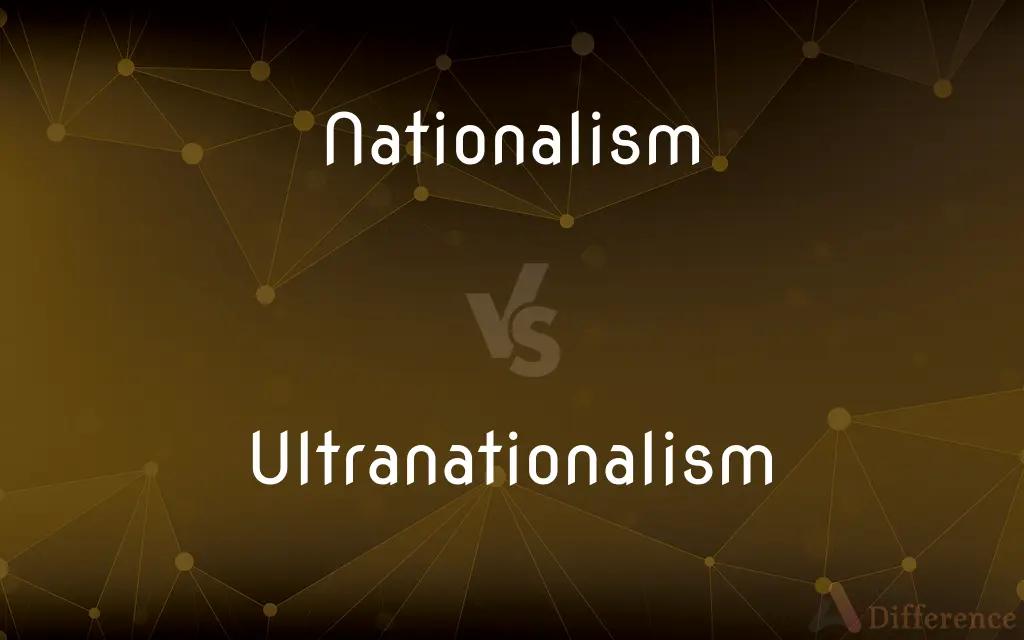Nationalism vs. Ultranationalism — What's the Difference?
Edited by Tayyaba Rehman — By Urooj Arif — Updated on April 29, 2024
Nationalism involves pride in one's country and advocating for its sovereignty; ultranationalism extends this to extreme, often aggressive, support that can exclude or harm others.

Difference Between Nationalism and Ultranationalism
Table of Contents
ADVERTISEMENT
Key Differences
Nationalism fosters a sense of identity and unity among a nation's people, promoting cultural pride and political independence. Ultranationalism, on the other hand, intensifies these feelings to a degree that often justifies superiority over other nations and cultures.
Nationalism can serve as a unifying force, encouraging participation in civic activities and national development. Ultranationalism, whereas, may lead to isolationism and xenophobia, potentially damaging international relationships.
Nationalists may seek to preserve their country's traditions and autonomy through democratic processes. Ultranationalists may pursue these goals through authoritarian means, disregarding democratic ideals and human rights.
Nationalism often supports the idea of national self-determination within the framework of international law. Ultranationalism frequently disregards international norms, advocating for expansion or punitive measures against perceived enemies.
Nationalism is generally viewed as a positive force when it respects other nations' rights and sovereignty. Ultranationalism, on the other hand, is often criticized for leading to conflict and intolerance due to its extreme nature.
ADVERTISEMENT
Comparison Chart
Scope of Pride
In one's country
Extreme pride, often aggressive
Political Methods
Democratic processes
Authoritarian, non-democratic
View on Other Cultures
Respectful or neutral
Often dismissive or hostile
Goal
National unity and sovereignty
National dominance or purity
International Relations
Cooperative or neutral
Often isolationist or aggressive
Compare with Definitions
Nationalism
Loyalty and devotion to a nation.
Nationalism motivated her to serve in the national army.
Ultranationalism
Intense loyalty to one's country to the detriment of international relations.
Ultranationalism in his speeches alarmed neighboring countries.
Nationalism
A sentiment that binds people of a nation together.
The festival was a display of nationalism and cultural pride.
Ultranationalism
Extreme nationalism that promotes an aggressive stance against foreign nations.
Ultranationalism has led to several diplomatic conflicts.
Nationalism
The desire for national advancement or independence.
Nationalism was the driving force behind their struggle for independence.
Ultranationalism
A form of nationalism marked by a feeling of superiority over other nations.
Ultranationalism is often rooted in historical grievances.
Nationalism
Advocacy of political independence for a particular country.
Nationalism is at the core of his political agenda.
Ultranationalism
Advocacy of extreme measures to protect national interests.
He justified the aggressive policies as necessary under ultranationalism.
Nationalism
A political ideology that emphasizes national interests.
His speeches often reflect a strong sense of nationalism.
Ultranationalism
A belief in the need to maintain or restore a nation's purity.
Ultranationalism often involves rigorous policies against immigrants.
Nationalism
Nationalism is an idea and movement that holds that the nation should be congruent with the state. As a movement, nationalism tends to promote the interests of a particular nation (as in a group of people), especially with the aim of gaining and maintaining the nation's sovereignty (self-governance) over its homeland.
Ultranationalism
Ultranationalism or extreme nationalism is an extreme form of nationalism in which a country asserts or maintains detrimental hegemony, supremacy, or other forms of control over other nations (usually through violent coercion) to pursue its specific interests. Ultranationalist entities have been associated with the engagement of political violence even during peacetime.In ideological terms, scholars such as British political theorist Roger Griffin have found that ultranationalism arises from seeing modern nation-states as living organisms directly akin to physical people such that they can decay, grow, die, and additionally experience rebirth.
Nationalism
Identification with one's own nation and support for its interests, especially to the exclusion or detriment of the interests of other nations
Their nationalism is tempered by a desire to join the European Union
Ultranationalism
Extreme nationalism, especially when opposed to international cooperation.
Nationalism
Devotion, especially excessive or undiscriminating devotion, to the interests or culture of a particular nation-state.
Ultranationalism
Extreme nationalism, the belief in the superiority of one's nation and of the paramount importance of advancing it.
Nationalism
The belief that nations will benefit from acting independently rather than collectively, emphasizing national rather than international goals.
Ultranationalism
Fanatical patriotism
Nationalism
The belief that a particular cultural or ethnic group constitutes a distinct people deserving of political self-determination.
Nationalism
Patriotism; the idea of supporting one's country, people or culture.
Nationalism
Support for the creation of a sovereign nation (which does not currently exist).
Basque nationalism
Kurdish nationalism
Nationalism
Support for the union of Northern Ireland and the Republic of Ireland.
Nationalism
The state of being national; national attachment; nationality.
Nationalism
An idiom, trait, or character peculiar to any nation.
Nationalism
National independence; the principles of the Nationalists.
Nationalism
A devotion to one's country; patriotism;
Nationalism
The policy of advocating the independence of one's country.
Nationalism
The policy of advocating the interests of one's own country exclusively, regardless of effects of a country's actions on other countries.
Nationalism
Love of country and willingness to sacrifice for it
Nationalism
The doctrine that several different cultures (rather than one national culture) can co-exist peacefully and equitably in a single country
Nationalism
The aspiration for national independence felt by people under foreign domination
Nationalism
The doctrine that nations should act independently (rather than collectively) to attain their goals
Common Curiosities
Can nationalism be harmful?
While nationalism can unify a country, excessive nationalism can lead to isolationism, discrimination, and conflicts with other countries.
What is ultranationalism?
Ultranationalism is a form of nationalism that is extreme, often marked by a belligerent foreign policy, ethnic exclusivity, and authoritarian tendencies in governance.
What is nationalism?
Nationalism is an ideology and movement characterized by the promotion of the interests, culture, and identity of a nation, especially with the aim of gaining and maintaining the nation's sovereignty over its homeland.
How does nationalism differ from patriotism?
Nationalism is often seen as a political principle linked to the sovereignty of a nation, whereas patriotism is more about emotional attachment and pride in one's country.
What role does education play in shaping nationalist sentiments?
Education can play a critical role in shaping nationalist sentiments by influencing how history and current events are taught, potentially fostering a sense of pride and unity or, conversely, sowing divisions.
What are the dangers of ultranationalism?
Ultranationalism can lead to severe xenophobia, ethnic cleansing, and aggressive wars, potentially causing immense harm both domestically and internationally.
How does ultranationalism affect domestic policies?
Ultranationalism can lead to stringent immigration laws, aggressive national security measures, and policies that suppress minority rights in the name of national cohesion and purity.
Is ultranationalism always linked to racism?
While not always explicitly linked to racism, ultranationalism frequently includes racist elements, as it often entails belief in national superiority and purity, which can manifest as ethnic or racial discrimination.
How can nationalism positively impact a country?
Nationalism can foster unity, improve political participation, and inspire collective efforts towards national development and self-sufficiency.
How do nationalist movements affect globalization?
Nationalist movements can challenge globalization by emphasizing local jobs, industries, and cultural practices, often advocating for policies that restrict free trade and movement of people.
Can a country experience both nationalism and ultranationalism?
Yes, within a country, there can be mainstream nationalist movements that coexist with more extreme ultranationalist groups, each influencing the national discourse to varying extents.
What are the psychological effects of ultranationalism on a society?
Ultranationalism can lead to increased societal division and conflict, a heightened sense of insecurity among minorities, and an overall atmosphere of fear and hostility.
What typically drives the rise of ultranationalism?
Ultranationalism often rises in response to perceived threats to national identity, economic instability, or in the aftermath of national humiliation or perceived injustice.
What are some historical examples of ultranationalism?
Examples include Fascist Italy under Mussolini, Nazi Germany under Hitler, and Imperial Japan during World War II, all of which pursued aggressive expansionist and exclusionary policies.
How do other countries typically respond to a nation's ultranationalist policies?
Countries may respond with diplomatic isolation, economic sanctions, or by strengthening their own national security measures, depending on the severity and impact of the ultranationalist actions.
Share Your Discovery

Previous Comparison
Detrimental vs. Harmful
Next Comparison
Certified vs. QualifiedAuthor Spotlight
Written by
Urooj ArifUrooj is a skilled content writer at Ask Difference, known for her exceptional ability to simplify complex topics into engaging and informative content. With a passion for research and a flair for clear, concise writing, she consistently delivers articles that resonate with our diverse audience.
Edited by
Tayyaba RehmanTayyaba Rehman is a distinguished writer, currently serving as a primary contributor to askdifference.com. As a researcher in semantics and etymology, Tayyaba's passion for the complexity of languages and their distinctions has found a perfect home on the platform. Tayyaba delves into the intricacies of language, distinguishing between commonly confused words and phrases, thereby providing clarity for readers worldwide.
















































